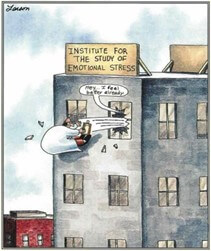This issue’s post

“This is life-changing!”
- Winning Hearts and Minds is regularly qualified as ‘life changing’
- Here is our opinion.
First of all: we would never have dared to think such a thing. It is the participants themselves who say so, when they say so. After a few moments of pride, we immediately ask: “Oh, yes? And in what way?” And here are some of their answers: “I feel liberated”, “I’m not afraid anymore”, “I’m not ashamed”, “I feel energised! “I feel like I can do anything” …
The paradox is that our training is only focused on professional presentations. There are no personal development exercises. Or maybe there are. You see, public speaking touches on so many aspects of what makes a human being that, without appearing to do so, the whole course becomes an unusual experience.
Because we deal with self-confidence and the physical and psychological symptoms of stress. We introduce the ingredients and mindset for success (in any field). We work on the voice (which itself often works on the emotional side of things); on eye contact and how to bond with others, and on the structure of speech (which is modelled on the needs of the audience). We practice positive reinforcement and we insist on care for others. All these aspects contribute to presenting with excellence. And in the end, when you embrace these values, you are indeed changed.
What else?

Our brains are very similar to those of 70,000 years ago!
- Today, human beings are faced with major challenges.
- But our brains are lagging behind.
Our brain is the result of a slow and progressive evolution. It is interesting to know where our brain is on the evolutionary scale. What is its programme? Our world has evolved at a particularly crazy pace in recent decades… We have gone from the plough to the moon in less than a century. That’s impressive… What about our brains?
The answer to this question is quite unsettling. If you could go back in time and kidnap a baby from a family of Homo Sapiens Sapiens from 70,000 years ago, you wouldn’t be able to tell the difference from a baby born in 2022, and if you were given the opportunity to raise that baby to adulthood, you might see him or her become a lawyer or a trader…
What this means is that our brains are still programmed, when we are born, as they were 70,000 years ago. Programmed to survive, to stand up to sabre-toothed tigers and to provide a livelihood in the Paleolithic. Our brains are not programmed and ready for the digital world, for Instagram or for Metaverse… They are not ready for global warming and the global collaboration that would require. They are not ready for any of the big issues of tomorrow and yet they are all we have to go on…
“Courage !”… as one would say in French.
What’s in it for you?

The biology of stress: a cocktail of five hormones
- Stress is the result of a hormonal chain reaction.
- Five different hormones are involved.
First, there is ACTH, or adrenocorticotropic hormone, secreted by the pituitary gland, a gland located at the base of the brain. Its role is to stimulate the adrenal glands, which in turn release cortisol. The purpose of cortisol is to provide the brain with sufficient energy to prepare us to cope with stress. It is involved in the regulation of blood pressure, cardiovascular function and immune function.
At the same time, adrenaline is released. It prepares the body to respond to stress: heart rate and breathing accelerate, blood pressure increases. Oxytocin is also involved, especially in our social behaviour. It is particularly involved in the mother-child relationship. And finally, vasopressin, which is also called the antidiuretic hormone. It regulates urinary functions and blood pressure. It plays an important role in managing anxiety.
Unfortunately, our ‘survival’ system does not distinguish between an earthquake and traffic jams: in both cases our stress releases adrenaline and cortisol – to name but two – which, in the long run and too often repeated, can have harmful consequences. Cortisol, for example, sends a message of hunger to the brain, to replenish energy reserves. Weight gain is the result. And day after day, stress can also contribute to the development of type 2 diabetes, cardiovascular problems, and even memory problems, all of which are linked to the long-term toxicity of these hormones, which are nevertheless essential for the human body.
To fight against stress and keep it “under control”, the best remedy is still breathing. That is to say, each time we become aware that it is about to overcome us, we stop and concentrate on breathing as deeply and slowly as possible – abdominally – until body and mind are feeling calm overall. Taking five minutes to think of nothing else and do nothing else can save a whole day.
Sources
About this post:
- https://www.futura-sciences.com/sante/questions-reponses/divers-sont-hormones-liees-stress-3069/
- https://fr.chatelaine.com/sante/cortisol-lhormone-meconnue-du-stress/
About abdominal or diaphragmatic breathing:
 Najberg Milne
Najberg Milne


